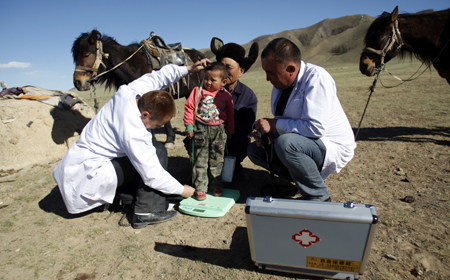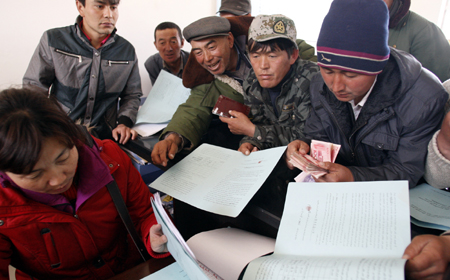Herders hope for greener pastures with new schedule
Updated: 2012-07-12 13:25
By Cui Jia (China Daily)
|
|||||||||||
A rise in crime
Inequality is unlikely to be the only problem thrown up by the new regulations. There are growing concerns that the prohibition on grazing could lead to a rise in crime, according to Junjuma, president of the People's Court of Barkol Kazak autonomous county, less than 100 kilometers from Yiwu.
"Because of a lack of enclosed herding facilities, the prohibition might cause livestock numbers to decrease over the short term, and that could lead to a higher retail price. As a result, more criminals would set their sights on the animals," he warned.
The numbers and scale of livestock theft have already increased during the past two years, and rustling has become the top crime in Barkol. In 2011, the court dealt with a case where a group of 12 people stole livestock, including sheep and cattle worth 220,000 yuan. The authorities took the case seriously and the ringleader of the gang was sentenced to 13 years in prison. The harsh sentence didn't prove to be much of a deterrent, however, and earlier this year a separate group of rustlers was caught red-handed, stealing more than 100 cattle and horses.
The criminals confessed that the livestock are easy to steal and will always sell for a good price. They simply drove a truck onto the remote grassland and loaded it with whatever they could catch. Then they transported the animals to distant areas to prevent local herdsmen from recognizing the distinctive branding marks, said Junjuma.
Some of the thefts speak of a combination of ingenuity and desperation: When a young man carrying a "woman" on the pillion seat of his motorbike was stopped for speeding by traffic police, the officers were astonished to discover that the "woman" was actually three sheep tied together. The man had simply slid a dress and a headscarf over the animals before binding them to himself and attempting to make his getaway.
In another incident, a herdsman discovered that one of his cows was missing. By coincidence, his neighbor had bought a new heifer that very day, although it was a different hue from the one that had disappeared. Later the police discovered that it was the same cow: The neighbor had simply used domestic paint to change its color from brown to black.
Settlement life beckons
Away from security concerns, Ajey has just spent 1,000 yuan on a new tent for the summer grazing season. It's traditionally Kazak in style, round and with a spire-shaped top, but this is likely to be the only year he will have an opportunity to use it. In September, he will move into a new settlement where the houses have been built especially for the herdsmen. "I will ask the others to graze my sheep for me and I'll stay at the settlement to take care of their sheep."
Ajey's new home - equipped with electricity, running water and a sheep shed alongside each house - may be a far cry from the nomadic world of his ancestors, but he remains a herder at heart: "I still believe animals that run wild on the grassland taste much better, but as long as my sheep are close by, I'm happy."
Contact the writer at cuijia@chinadaily.com.cn
|
 |
|
Kadar Bek (left), director of the health center in Qianshan township, conducts regular health checks on the herdsmen. [Photo/China Daily] |
|
 |
|
Herdsmen in Qianshan township sign a grassland protection agreement with the local government in exchange for government subsidies. This is the first year that the herdsmen have received the subsidies, following the central government's launch of a reward program for grassland protection in eight provinces and regions in 2011. [Photo/China Daily] |


Related Stories
Happy new life for herders 2012-07-11 20:22
The future looks solar bright for herders' kids 2011-09-13 13:41
Herders face five year ban on grazing 2011-08-01 10:45
Tibetan farmers, herders improve living standard 2011-02-25 16:36
Herders leaving grasslands in search of greener pastures 2010-08-03 07:50
863 herders stranded in snow in Qinghai 2008-11-12 07:14
Today's Top News
President Xi confident in recovery from quake
H7N9 update: 104 cases, 21 deaths
Telecom workers restore links
Coal mine blast kills 18 in Jilin
Intl scholarship puts China on the map
More bird flu patients discharged
Gold loses sheen, but still a safe bet
US 'turns blind eye to human rights'
Hot Topics
Lunar probe , China growth forecasts, Emission rules get tougher, China seen through 'colored lens', International board,
Editor's Picks

|

|

|

|

|

|





